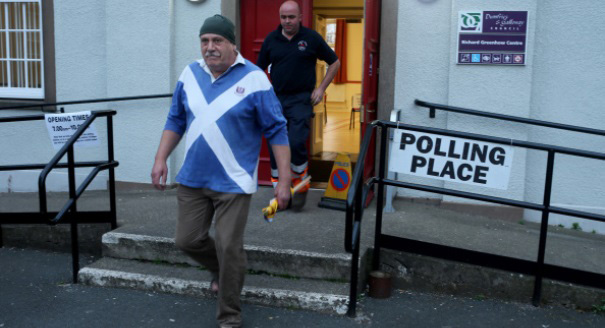The Scottish independence referendum of September 18, 2014, is an impeccably constitutional undertaking: all of its terms were agreed on beforehand between the UK parliament at Westminster and Scotland’s separate legislature at Holyrood. But it is far from being a consensual exercise.
While the Scottish National Party (SNP), which holds the majority at Holyrood, has striven to paint a convincing picture of life in an independent Scottish state, the authorities in London have fought for a continued union with more threats than blandishments. It is as if a husband in an uneasy marriage, instead of saying “I love you,” were to warn “Divorce me and I’ll strip you of everything.”
The harshness of the UK establishment’s message has drawn attention and some raised eyebrows abroad. As decision day dawns, however, it has become clear that well-founded fears lie behind the possibility of an independent Scotland.
A “yes” vote for independence would consecrate Scotland’s national identity. But even if there is no immediate risk of domino effects in Wales and Northern Ireland, which also enjoy a degree of autonomy from London, Scottish secession could raise tough and possibly unanswerable questions about the identity of England and the rest of the UK.
Concretely, what would the UK lose? With just 8–9 percent of Britain’s population, Scotland has nearly a third of its territory (about 30,000 out of 94,000 square miles). Strategically, Scotland lies on Europe’s North Atlantic front, where any major warlike breakout by Russian forces is traditionally most likely to happen. If, conversely, the Arctic region opens up to new profits and partnerships because of melting sea ice, Scotland would be first in line to benefit.
The southern part of the British landmass might well worry about losing control of its strategic buffer zone to the north. It might also fret about whether a separate Scotland would keep the back door closed properly against terrorists, smuggling, illegal immigrants, and the like.
Such concerns would logically be eased by tight crossborder cooperation based on shared membership of NATO and the EU. But Scotland’s right to join those bodies is one of the things the “no” campaign has most loudly called into question.
For geographical reasons, Scotland could claim at least 90 percent of the UK’s offshore oil and gas. The anti-independence campaign has played down the value of the remaining reserves, since they are central to calculations of Scotland’s likely economic viability. That does not mean that London would be happy to forego the revenue, or that losing it would have no impact on the pound sterling.
Defense spending is another sore point. The SNP calculates that Scottish taxpayers contribute ₤3.3 billion ($5.3 billion) per year to the UK’s defense, on both conventional and nuclear forces. The nationalists believe they could build an independent Scottish defense, adjusted to their new country’s territorial needs and more modest intervention policies, for some ₤2.5 billion ($4.1 billion). Be that as it may, losing Scotland’s input into Britain’s security would confront London’s defense planners with agonizing choices at a time when funds are already short.
The SNP has insisted that it will remove British nuclear submarines from Scottish territory if the Scots vote for independence. That would have its own financial implications. Whether the removal were to proceed fast or slowly, the costs of relocating nuclear facilities elsewhere would be massive—not to mention English residents’ reaction to such a new hazard in their backyards. Antinuclear campaigners dream that this financial blow would be the straw that breaks the camel’s back and drives the UK to give up its nuclear deterrent altogether.
It is an interesting question whether the UK’s loss would also be the EU’s, NATO’s, and Europe’s loss in general. At a time of other desperate pressures on European security and governance, many observers would be grateful to keep the status quo.
But if the UK’s European and North American partners had to adjust to an—unassailably democratic—“yes” vote on September 18, would they support a tough approach toward Scotland that might risk throwing the new country into a nonintegrated, undefended outer darkness? Would EU and NATO members disregard an Edinburgh government offering them its warmest assurances of cooperation and support?
If the UK authorities have done any serious contingency planning—for obvious reasons, none has been admitted publicly—the likelihood of external pressure for sensible compromises with Edinburgh could be another uncomfortable reality they may have to face. Scotland is not without positive sympathizers already, notably among its nearest neighbors. Denmark, Norway, and Ireland certainly have reasons to protest when strident pro-union campaigners scorn the idea of a community of 5 million safely managing its own affairs.
What of the opposite scenario? A “no” vote against independence would be a win for the UK, but London could still lose by the way it handles the aftermath. Any “yes” score of above 40 percent would keep the independence debate alive and demand some serious rethinking by all sides.
The three major Westminster-based parties have already agreed that Scotland will receive new delegated powers in the event of a “no” vote. Any such powers given to Scots as a “reward” for rejecting independence must gradually move Scotland’s everyday political, economic, and social experience away from England’s. In external affairs, the Scots would have some avenues to promote their separate identity more vigorously than they currently do.
Whether or not Scotland votes on September 18 to secede, it is in both sides’ interest that Anglo-Scottish relations remain cordial. Too much triumphalism, coercion, and refusal of crossborder compromise by the pro-union camp have the potential to become losing tactics—whatever the outcome of the referendum.
Alyson Bailes is adjunct professor at the University of Iceland and a fellow and board member at the Scottish Global Forum.








